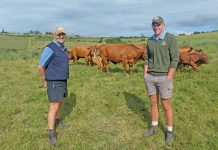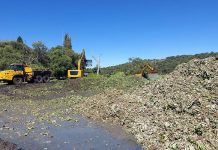Hard work, humbleness and a keen sense of responsibility come to mind when one thinks of Shilling Shai, a black farmer in the Tzaneen district. He took lessons learned from his lifelong employer and incorporated them into his own ideals to overcome the drawbacks of a lack of education and penniless pockets. An old man today, he still puts in a hard day’s work; he’s a farmer to the depths of his soul. Jasper Raats tells his story.
Shilling Shai was still a boy when he started working for the late Kobus Kleynhans on the farm Pusela outside Tzaneen. Situated on the outskirts of town, behind where the Ben Vorster High School is today, Kobus started carving out a living on the small farm with Shilling as his trusted worker and companion.
Shilling fondly remembers the days of hard work, building a business from nothing. His first job was to take care of Kobus’s only two cows, Ester and Geluk. But as the herd grew, so did Shilling.
The Kleynhans family decided his hard-working nature and eagerness to learn would be wasted on cattle minding and they started training him to work in the small cash store they had on the farm.
Working side-by-side with one of the Kleynhans daughters, Suzette, it was his job to weigh off the sugar, maize meal and flower for customers. He remembers that back then it cost a tiekie (three pennies) for a packet of sugar.
Kobus was a strict man and he didn’t spare the rod. “Suzette and I got many hidings for making careless mistakes,” Shilling remembers.
But Shilling doesn’t resent his former employer for the hidings. “He practically raised me and I have instilled the same values in my youngest son, Oupa. Today he’s a well-educated young man whom I know will make a success of his life, thanks to the hidings I have given him.”
As the Kleynhans’s business interests expanded, Shilling was deployed at their other cash stores. First in Ttzaneen, later in Lletsitele. Iin the meantime, Kobus bought Fonteinplaats outside Ttzaneen and as his strength tapered off, Shilling returned to the farm to learn everything about agriculture and the business of farming. “I knew he was preparing me to run the farm for the family when he was no longer there.”
When Kobus passed away Shilling did exactly that. It was hard work and he had a wife and six children to support, so Shilling talked to the Kleynhans daughters about an increase. But his timing was bad. Burdened with debt they had inherited from their father, they explained that they couldn’t afford to pay him more at the time.
Breaking for change
And so Shilling left everything he knew and returned to the communal land in the Trichardtsdal district where he was born. He took his family and the cattle he had bought over the years and asked the local chief for a piece of land.
After much deliberation, the chief let him have 3ha.
Shilling soon had a flourishing little farming business supplying the local hospital with tomatoes, beetroot, carrots, spinach, sweet potatoes and maize.
But then disaster struck. Drought killed 18 head of cattle. “I only had three cows left when the rain finally came,” he says.
Fortunately his crops survived thanks to a dam he had built. It had taken Shilling a year to pay for the dam and then, when the rain came, the wall broke. “Those were hard times,” he remembers. “I took my last few cents to drill a borehole. I had no choice, the chief refused to let me irrigate from the canal running alongside my vegetable gardens.”
While Shilling was struggling to survive, the family of his former employer was trying to contact him. They hoped he would visit the co-op he used to get supplies from when he still worked for their father, but Shilling was buying his inputs from the co-op at Trichardtsdal. Another farmworker finally tracked him down and Shilling contacted the family.
The Kleynhans daughters were now married. Bertus Bierman, married to the youngest Kleynhans daughter, told Shilling they needed him and his family to return to Fonteinplaats to manage it for them. A small neighbouring farm had fallen into Bertus’s hands and he made it available to Shilling and his family as part of the remuneration.
Later, Bertus decided to sell Fonteinplaats and he gave Shilling an option to buy the 33ha farm he was living on for R250 000. For a smallholding so close to a big town it was a fantastic deal, but a daunting one for Shilling. “I’m not an educated man. I didn’t know where to begin buying a farm.”
So he asked for help. First at the Department of Land Affairs, but they said the land might be claimed and turned him away. Then at the Land Bank. He asked Oupa to help him fill out the application forms.
Months later Oupa phoned the bank and they said they would come and value the farm. But they never came.
Shilling continued with his work, rebuilding his cattle herd, taking care of the mango trees and keeping invasive weeds at bay. Fonteinplaats was eventually jointly bought by two well-known farmers, Theo de Jager and Pieter Henning.
They realised Shilling’s value and employed him as foreman. “He’s an excellent farmer with a managerial style that gets more out of people than we can,” says Theo.
It was Theo who finally went to Pretoria to enquire about Shilling’s loan from the Land Bank and who put pressure on banking officials to process the loan application.
“Three years I waited before they finally approved my loan,” says Shilling.
Shilling had to sell most of his prized Ngunis to cover the transfer and registration costs. He had to start rebuilding his herd with only eight head of cattle.
“I’m not too worried about that, it’s six more than Kobus had when he started out,” says Shilling. “One day I will have to sell this farm and get a bigger one for all my cattle,” he enthuses.
The future
This year the harvest from the mango trees wasn’t as good as he had hoped, but with the money he earns taking care of the neighbouring farm, he will be able to service his loan and have a bit to spare for inputs. “I plan to plant 3ha of cabbage and also tomatoes and maize next year.
I will plant the cabbage and tomatoes in blocks so I have a harvest every month to keep up my cash flow between mango harvests. If I have a better harvest next year it will go towards rebuilding my cattle herd,” Shilling explains.
He plans to rent grazing land for the cattle and keep producing crops on his own land. He has a borehole with enough water to irrigate but prefers to irrigate from the dam, keeping the borehole in reserve for times of drought.
He has applied for a Land Bank loan for irrigation piping, but again he waits and prays – every night. “I’m a hard worker and have never borrowed a cent that I’ve not paid back. That’s how Kobus taught me. He too was poor once, but he worked hard.”
Contact Shilling Shai on 083 746 8145.








